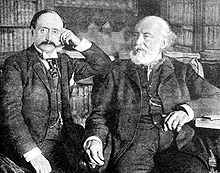Ferenc Kossuth
Ferenc Lajos Ákos Kossuth (born November 16, 1841 in Pest , Austrian Empire , † May 25, 1914 in Budapest ) was a Hungarian engineer and politician.
Life
Ferenc, the eldest son of Lajos Kossuth , followed his father into emigration after the failed uprising against the Habsburgs in 1850. He studied engineering in Paris and London and from 1861 worked in Liguria as a railway engineer. Ferenc Kossuth was involved in the construction of the Mont Cenis Tunnel , worked in industry and mining and built the first steel bridge over the Nile . From 1859 he was secretary of the Magyar Nemzeti Igazgatósság , the Hungarian National Directorate, a kind of government in exile for an independent Hungary. Only after his father's death in 1894 did he return to Hungary. He accompanied his father's body to a magnificent funeral in Budapest. Then Kossuth began his political career; he was elected to the Hungarian Parliament in 1895 and became leader of the Independence Party in 1897 .
The "Hungarian crisis" began with the parliamentary elections in 1905 , as the Liberal Party lost its majority for the first time since the compromise in 1867 . The Independence Party under Kossuth led a coalition with a parliamentary majority. The main point of contention between the throne and the opposition was the abolition of the German language of command in the Joint Army .
Nevertheless, on June 18, 1905, General Géza Fejérváry was appointed by King Ferenc József as head of government of an official government. The opposition under Kossuth called the government unconstitutional because it did not come from a parliamentary majority. Therefore Fejérváry ruled with the help of the king, who adjourned parliament several times, bypassing parliament. The opposition under Kossuth then called for “national resistance” against the “gendarme government”, and recruitment and tax payments were refused in many counties .
Interior Minister Jósef Kristóffy then started negotiations with the Social Democrats and left-wing liberals, to whom he promised reforms in the electoral law and in the social policy area. The general suffrage planned by Fejérváry, however, endangered the power of the national aristocratic Magyar elites. An explosive domestic political climate developed. In the Vienna War Ministry , General Beck developed plans (“Case U” for Hungary) to put down a possible uprising in Hungary by force. On February 19, 1906, Franz Joseph and Fejérváry even had the parliament building occupied by the Honvéd . The mood in the population and civil servants gradually turned against the opposition under Kossuth and they agreed on Sándor Wekerle as the new prime minister, which is why Fejérváry finally resigned on April 8, 1906.
Kossuth served in the Wekerle government from April 8, 1906 to January 17, 1910 as Minister of Commerce. He was not a political talent and was even involved in corruption affairs, but thanks to his father's nimbus and advertising power, he was an important political force in Hungary for over a decade.
literature
- Goldinger: Kossuth von Urvard and Kossut, Ferenc. In: Austrian Biographical Lexicon 1815–1950 (ÖBL). Volume 4, Verlag der Österreichischen Akademie der Wissenschaften, Vienna 1969, p. 151 f. (Direct links on p. 151 , p. 152 ).
- PF Sugar: Kossuth, Ferenc . In: Biographical Lexicon on the History of Southeast Europe . Volume 2. Munich 1976, pp. 491-493
Web links
Individual evidence
- ^ A b c Goldinger: Kossuth von Urvard and Kossut, Ferenc. In: Austrian Biographical Lexicon 1815–1950 (ÖBL). Volume 4, Verlag der Österreichischen Akademie der Wissenschaften, Vienna 1969, p. 151 f. (Direct links on p. 151 , p. 152 ).
- ^ Árpád von Klimó : Nation, Denomination, History. On the national historical culture of Hungary in the European context (1860–1948). Verlag Oldenbourg, Munich 2003, ISBN 3-486-56746-2 , p. 76.
- ↑ a b c d Géza Andreas von Geyr: Sándor Wekerle. 1848-1921. The political biography of a Hungarian statesman of the Danube Monarchy. (= Southeast European Works 91). Munich 1993, ISBN 3-486-56037-9 , p. 212ff.
- ^ Alice Freifeld: Nationalism and the crowd in liberal Hungary, 1848-1914. Woodrow Wilson Center Press, Washington DC, 2000, ISBN 0-8018-6462-3 , p. 219.
- ↑ István Deák : Beyond nationalism. A social and political history of the Habsburg officer corps, 1848-1918. Oxford University Press, New York 1990, ISBN 0-19-504505-X , p. 70.
| personal data | |
|---|---|
| SURNAME | Kossuth, Ferenc |
| ALTERNATIVE NAMES | Kossuth, Franz |
| BRIEF DESCRIPTION | Hungarian engineer and politician |
| DATE OF BIRTH | November 16, 1841 |
| PLACE OF BIRTH | pest |
| DATE OF DEATH | May 25, 1914 |
| Place of death | Budapest |

